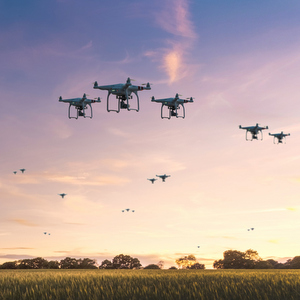The impact of human activity on global climate processes and the role of ecosystems in these processes are being actively studied all over the world. For this purpose, the researchers create carbon landfills — research sites where the processes of greenhouse gas emission and absorption in various ecosystems are studied. Currently, in the regions of Russia, there are twelve such sites covering the entire territory of the country from Kaliningrad to Sakhalin. Now the Samara Region will also be among them.
Our carbon landfill will become the first agricultural one in Russia. It is being created as part of the activities of the world-class REC “Engineering of the Future”, together with Samara State Agrarian University (SamGAU) and Samara State Medical University (SamGMU). The industrial partners are the experimental farm “Orlovka AIC”, the United Chemical Company “UralChim”, as well as the Company “Shchelkovo Agrochim”.
"The project on creating the agricultural carbon landfill is of strategic importance for achieving carbon balance, saving the potential of soil fertility, reducing food risks, strengthening Russia’s position in the international market of low-carbon products, and preserving the nation’s health. As project participants, we face several large-scale research and practical tasks. Samara University has serious scientific background in a number of key areas, and joining efforts with our colleagues from SamGAU, SamGMU and industrial partners in framework of the REC “Engineering of the Future” will cover the entire range of tasks”, explained Vladimir Bogatyrev, Rector of the University.
Scientists will have to develop the mathematical model intended for estimating dynamics of greenhouse gas emissions in conditions of the Volga Federal District, and adapt it for agricultural soils in Russia. It is also necessary to work out remote methods for monitoring greenhouse gas emissions and runoff.
The project participants should study the soil microbiome, its carbon asset, and develop standards for microbiological studies of soils.
They will have to develop a draft national MPV protocol for measuring, reporting and verifying changes in soil carbon stocks, with the opportunity for calculating carbon credits for selling them in the carbon market. And, finally, to develop training programs on technologies of soil-protective resource-saving (carbon) agriculture for Russian farmers.
Agriculture is one of the main emitters of greenhouse gases. In 2020, greenhouse gas emissions from the agricultural sector of Russia amounted to 116.6 million metric tons in CO2 equivalent. Today it is already known that agrotechnical methods of soil protective and resource-saving agriculture are capable of sequestering carbon in the soil in the amount of up to 10.5 metric tons per 1 ha per year. On our country’s scale, this will allow depositing up to 660 million metric tons of carbon annually. With proper management, implementation of quotas in the carbon market can bring farmers additional income from 1 thousand rubles per ha.
Experts of the Ministry of Education and Science of Russia noted that at Russian carbon landfills, the processes of greenhouse gas emissions and absorption will be monitored using remote technologies, the list of which includes a number of top developments of Samara University. In particular, these are research equipment and software in the field of processing big data and satellite images, including compact hyperspectral imaging equipment, unmanned aerial vehicles, as well as a portable gas chromatograph developed under the Vladimir Platonov’s guidance.
The carbon landfill is planned to be deployed in Pokhvistnevsky District of the Samara Region, on the basis of the experimental farm “Orlovka AIC”, where soil-saving farming technologies have been applied for 7 years, and the large array of data suitable for retrospective analysis has been accumulated. The landfill area will be 4,785.8 ha. According to the Agreena Danish Company’s independent assessment, by the end of 2021, in the fields of the farm, soil carbon has been accumulated on average in the amount of 2.5 metric tons per ha.
As Vladimir Platonov noted, the plan of the research work on development of ground-based and remote methods for measuring and regulating the sequestration potential of the carbon landfill land plots is designed for the period up to the end of 2025.
“Besides solving specific tasks for the carbon market development in Russia, generalization and dissemination of the soil-saving agriculture experience, participation in the project on creating the carbon landfill will allow Samara University to significantly contribute to ensuring our country’s technological sovereignty and elaborating domestic methods and analytical equipment for monitoring greenhouse gas flows”, stressed Vladimir Platonov.
